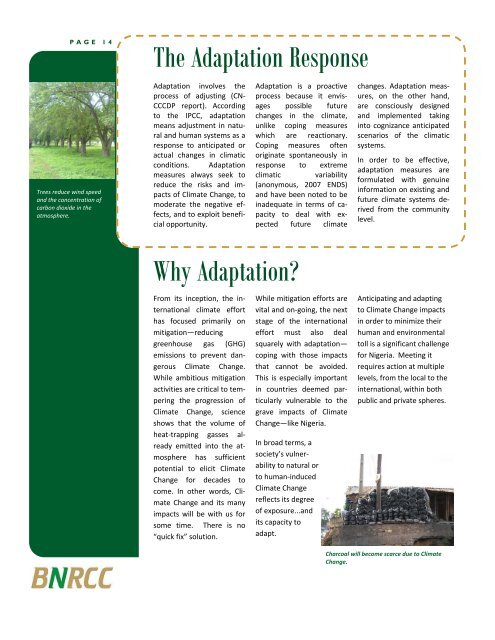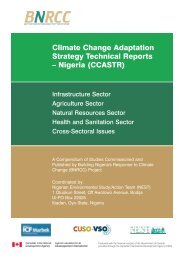BNRCC Project Backgrounder - Building Nigeria's Response To ...
BNRCC Project Backgrounder - Building Nigeria's Response To ...
BNRCC Project Backgrounder - Building Nigeria's Response To ...
You also want an ePaper? Increase the reach of your titles
YUMPU automatically turns print PDFs into web optimized ePapers that Google loves.
PAGE 14Trees reduce wind speedand the concentration ofcarbon dioxide in theatmosphere.The Adaptation <strong>Response</strong>Adaptation involves theprocess of adjusting (CN‐CCCDP report). Accordingto the IPCC, adaptationmeans adjustment in naturaland human systems as aresponse to anticipated oractual changes in climaticconditions. Adaptationmeasures always seek toreduce the risks and impactsof Climate Change, tomoderate the negative effects,and to exploit beneficialopportunity.Adaptation is a proactiveprocess because it envisagespossible futurechanges in the climate,unlike coping measureswhich are reactionary.Coping measures oftenoriginate spontaneously inresponse to extremeclimatic variability(anonymous, 2007 ENDS)and have been noted to beinadequate in terms of capacityto deal with expectedfuture climatechanges. Adaptation measures,on the other hand,are consciously designedand implemented takinginto cognizance anticipatedscenarios of the climaticsystems.In order to be effective,adaptation measures areformulated with genuineinformation on existing andfuture climate systems derivedfrom the communitylevel.Why Adaptation?From its inception, the internationalclimate efforthas focused primarily onmitigation—reducinggreenhouse gas (GHG)emissions to prevent dangerousClimate Change.While ambitious mitigationactivities are critical to temperingthe progression ofClimate Change, scienceshows that the volume ofheat‐trapping gasses alreadyemitted into the atmospherehas sufficientpotential to elicit ClimateChange for decades tocome. In other words, ClimateChange and its manyimpacts will be with us forsome time. There is no“quick fix” solution.While mitigation efforts arevital and on‐going, the nextstage of the internationaleffort must also dealsquarely with adaptation—coping with those impactsthat cannot be avoided.This is especially importantin countries deemed particularlyvulnerable to thegrave impacts of ClimateChange—like Nigeria.In broad terms, asociety’s vulnerabilityto natural orto human‐inducedClimate Changereflects its degreeof exposure...andits capacity toadapt.Anticipating and adaptingto Climate Change impactsin order to minimize theirhuman and environmentaltoll is a significant challengefor Nigeria. Meeting itrequires action at multiplelevels, from the local to theinternational, within bothpublic and private spheres.Charcoal will become scarce due to ClimateChange.



![Download [PDF | 6.4MB] - Building Nigeria's Response To Climate ...](https://img.yumpu.com/50509683/1/184x260/download-pdf-64mb-building-nigerias-response-to-climate-.jpg?quality=85)
![Download [PDF | 620KB] - Building Nigeria's Response To Climate ...](https://img.yumpu.com/42187836/1/184x260/download-pdf-620kb-building-nigerias-response-to-climate-.jpg?quality=85)
![Download [PDF | 3MB] - Building Nigeria's Response To Climate ...](https://img.yumpu.com/41338963/1/184x260/download-pdf-3mb-building-nigerias-response-to-climate-.jpg?quality=85)
